Matthew Yglesias's Blog, page 2406
February 28, 2011
Medicaid Costs
Jamelle Bouie, a reminder that retirees aside healthcare is near the heart of many state budget issues thanks to Medicaid:
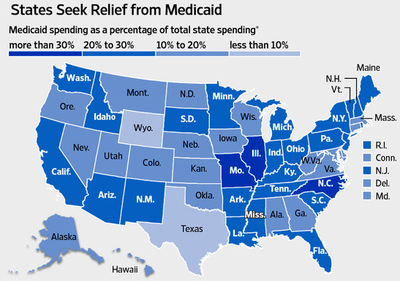
Almost everything in American politics circles back to health care costs. The government has committed to pay for health care for certain classes of people—the elderly, its own workforce, the poor—and health care costs are growing more rapidly than the economy as a whole. Meanwhile, on the private sector side the insurance market as we know it exists largely because of tax subsidies that, in turn, are becoming more expensive to provide. The fact that these are manifest themselves as separate issues called "Medicare," "Medicaid," "public sector compensation," "insurance premiums," etc. reflects the fact that we have an unusually patchworky health care system.


Health Care Costs Are Driving State Budget Woes, Like All Other Kinds Of Woes Everywhere

Paul Krugman and Kevin Drum write up a new Dean Baker paper (PDF) arguing that state pension shortfalls are actually pretty small, and mostly driven by the recent stock market crash.
But that doesn't mean that all's well when it comes to public employee retirement. Instead as Ryan McNeely argues, we've basically got a version of the Social Security / Medicare thing. The arm of federal retirement security programs dedicated to giving people money has a modest, manageable problem. The arm of state worker retirement programs dedicated to giving people money has a modest, manageable problem. But commitments to cover people's health care costs are a huge problem in a world where health care costs are growing as a share of GDP.
Of course the exact same thing is playing out in the private sector. Over the past twenty years, corporate compensation costs have been rising much faster than wages. That's because employers are paying more for health benefits. The private sector, in effect, has been Social Security to keep Medicare affordable. Or cutting pensions to keep retiree health care costs affordable. The fact that we keep defaulting in that direction reflects the political and social clout of the health care sector but the evidence is pretty overwhelming that providing health care services is not a cost-effective way of promoting health. Most people would be better off with more money and less health care coverage.


The Case For Bureaucrats

Reducing federal spending by reducing federal personnel costs is an appealing proposal because it lets politicians be for "less spending" without being for less programmatic activity. But as John Gravois argues in a new Washington Monthly article this is actually a huge problem. When congress mandates reduced staffing levels but doesn't otherwise change what the federal government is supposed to do, there's no way to get the job done but to rely more on contractors. And though contracting is sometimes the right way to go, to be properly executed you still need people supervising the contracts:
In other words, if Congress and the White House agree to substantial cuts in the federal workforce but don't also agree to eliminate programs and reduce services, the end result could be more spending and deficits, not less. Strange as it may sound, to get a grip on costs, we should in many cases be hiring many more bureaucrats—and paying more to get better ones—not cutting their numbers and freezing their pay. Because in many parts of government, the bureaucracy has already crossed that dangerous threshold beyond which further cuts can only mean greater risk of a breakdown. Indeed, much of the runaway spending we've seen over the past decade is the result of our having crossed that line years ago—the last time there was a Democrat in the White House, a divided government, and calls for slashing the federal workforce in the air.
He runs down examples of how understaffing has wound up leading to runaway contract costs and huge overruns. But he also runs down examples of a more insidious phenomenon—understaffed regulatory agencies being unable to properly enforce existing environmental and financial regulations. I think this latter piece is really the nub of the issue. "Let businesses pollute all over the place" doesn't sound so good as a political message. It's much more viable to simply starve the regulatory agencies of the funds needed to do the job effectively. That kind of stealth deregulation is incredibly pernicious, but it's also not amendable to this kind of "you think you're going to save money, but really you won't" type of argument that works for the contracting side.


Regional Inequality in China
When I was in China, all anyone could talk about was how much poorer other parts of China were than the parts I was seeing. The Economist's new set of interactive charts on China's provinces illustrates the point. Here's each province's PPP-adjusted GDP per capita:
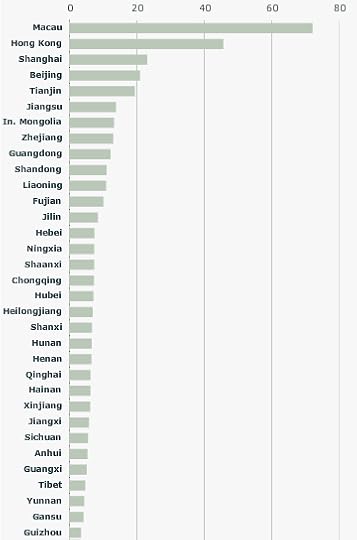
I was in Shanghai, Beijing, Zhejiang, and Liaoning the poorest of which is still about twice as rich as a province like Sichuan. One of the oddities of China is that it's biggest cities are actually a bit on the small side. Shanghai is only the tenth largest metropolitan area in the world (Hong Kong is 12th and Beijing is 19th) even though China is the largest population country in the world and these metropolitan areas are the richest parts of the country. There's no good economic logic to Shanghai being smaller than New York and Beijing being smaller than Los Angeles, but internal migration has traditionally been tightly controlled in China. That's changing, and increased migration to the highest-productivity areas of the country should be a continued source of growth for a while now.


Estimating the Union Vote Premium
I'm familiar of course with the fact that union households are more inclined to vote Democratic than are members of non-union households, but since union membership isn't distributed randomly amongst the population it's a bit difficult to know exactly what to make of that. Nate Silver, however, took National Election Survey data to do a logistic regression analysis to try to isolate the impact of specific demographic characteristics on the 2008 presidential vote:
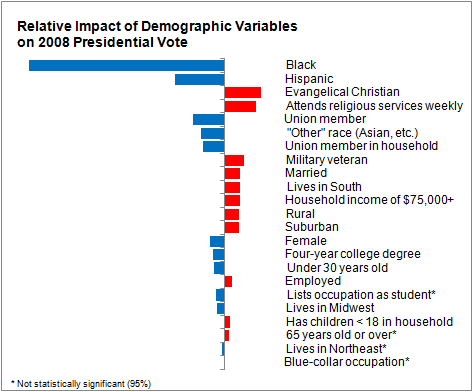
Union status, roughly speaking, is less important than race or religion but more important than the rest.


The Dual Oil Threats
When people talk about the risk posed to the economy by oil price spikes it's worth keeping in mind the fact that there are really two separate threats here.
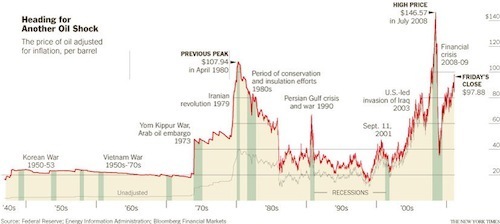
One is that expensive oil is a negative "real" shock to the American economy. Many of us use a lot of oil to go about our daily business, so expensive oil impairs that. But the other risk—larger in my view—is that higher energy prices could, by generating higher headline inflation, generate political pressure for tight monetary policy. There's no reason that should happen. Nothing about political upheaval in Libya implies that America's on the verge of a wage-price spiral with unemployment over 9 percent. But for months now there's been agitation for tight money that's seeking any kind of vaguely plausible pretext, and expensive gas might provide that pretext.


The Politics of Attention
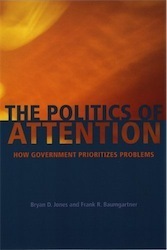
Bryan Jones and Frank Baumgartner, The Politics of Attention: How Government Prioritizes Problems was strongly recommended to me by a reliable source and it's certainly a very interesting perspective on the American policymaking process. It's also a book I found very difficult to read, offering a lot of pretty technical quantitative political science, and I'm not entirely sure I understood it. The key point here is that there are many more sources of information (reliable and unreliable, honest and dishonest, accurate and inaccurate) that congress could be paying attention to at any given time than congress will, in fact, pay attention to.
The frictions and disproportionality inherent to the way information gets processed by the system contributes to the American government's tendency to proceed by way of sporadic lurches rather than steady adjustments. Most of the time, congress does nothing. Then when it does do something, it tends to overreact.
One way they characterize this mathematically is to show that the probability density of policy changes has "high kurtosis" rather than being normally distributided. That means you get a very high peak and a large influence of extreme outcomes, with very little in the way of moderate change. This chart illustrates the point with regard to budget outlays:
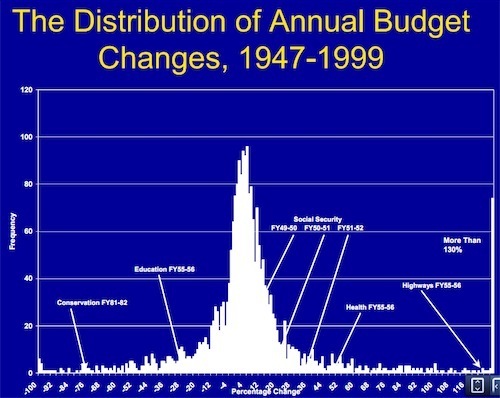
This isn't what the book is about by any means, but it's framework helps illustrate some of the problems with discretionary fiscal stimulus as a way to address a recession. Doing this correctly requires congress to evaluate and process information about the output gap, inflation expectations, the federal deficit, and state and local budget conditions in something approximating real time. And congress isn't up to the job even when, as was the case in 2009-2010, it was strongly in the interests of the congressional majority to address the situation correctly. Watching this process unfold as a bystander was horrifying but Politics of Attention tends to bolster the view that it's a systemic malady of how congress works rather than a unique character failure of the members who were in office at the time. The big piece of unfinished business from the current crisis is that we really, really, really need to find a way to bolster automatic fiscal stabilizers instead of just finding ourself once again watching helplessly next time.


February 27, 2011
Karl Marx on Mitch McConnell
JH reminds me of this passage from Karl Marx's "18th Brumaire of Louis Bonaparte":
Whatever amount of passion and declamation might be employed by the Party of Order against the minority from the tribune of the National Assembly, its speech remained as monosyllabic as that of the Christians, whose words were to be: Yea, yea; nay, nay! As monosyllabic on the platform as in the press. Flat as a riddle whose answer is known in advance. Whether it was a question of the right of petition or the tax on wine, freedom of the press or free trade, the clubs or the municipal charter, protection of personal liberty or regulation of the state budget, the watchword constantly recurs, the theme remains always the same, the verdict is ever ready and invariably reads: "Socialism!" Even bourgeois liberalism is declared socialistic, bourgeois enlightenment socialistic, bourgeois financial reform socialistic. It was socialistic to build a railway where a canal already existed, and it was socialistic to defend oneself with a cane when one was attacked with a rapier.
Folks sure were crazy in mid-19th century France!


Australia and Canada Winning the Future on "Most Livable Cities" List
Cities ranked by the Economist Intelligence Unit "on a combination of stability, health care, culture and environment, education, and infrastructure":
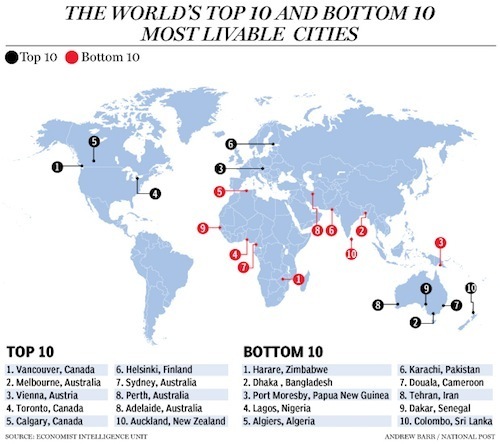
Considering how low the combined population of Canada, Australia, and New Zealand is, these smaller outposts of Angophone civilization are dominating the ranks to an impressive degree. I've been to Helsinki in December, and while I personally found it quite appealing the "livability" of anyplace that far north is going to substantially hinge on your willingness to see very little daylight for months at a time.


Alternate Vote And The Oscars
Via Rick Hertzberg, The Kings Speech stars Colin Firth and Helena Bonham Carter have both come out as supporters of shifting to what the Brits call an "alternative vote" system.
In the sort-of three party system in use in the UK, it's become quite rare for an MP to actually secure the majority of the vote in a constituency. Under alternative vote (often discussed in the US as "instant runoff voting") people rank candidates in order when nobody gets a majority, you take the candidate who finished last, strike his name, and then redistribute his votes to his supporters' second-place choices. Then you keep on trucking along until someone has a majority. The core supporters of AV have been Liberal Democrats (who are badly disadvantaged by the status quo voting system) but the Lib Dems have managed to alienate tons of people by joining David Cameron's coalition, which, somewhat ironically, they had to do in order to get the AV referendum done.


Matthew Yglesias's Blog
- Matthew Yglesias's profile
- 72 followers



